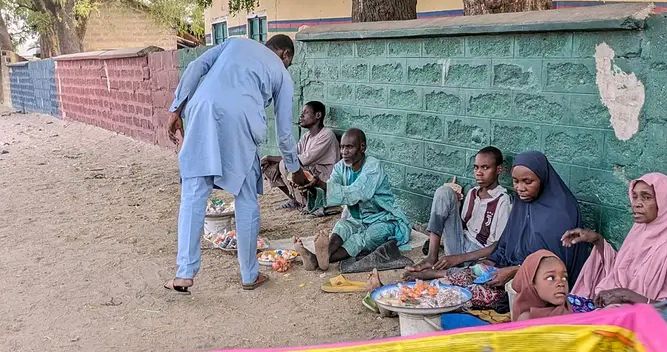Borno State commissioner for religious affairs promises to investigate claims that the food provided is of poor quality and beneficiaries are eating it only because they are hungry and do not have anything else.
Beneficiaries of the Borno State government’s Ramadan feeding programme have complained that the meals are of poor quality and say they are eating them only because they do not have anything else to eat – and cannot afford to buy decent food.
The free iftar – the fast-breaking evening meal of Muslims at the time of adhan (the call to prayer) of the Maghrib prayer – programme was initiated by the state’s ministry of religious affairs on Friday, March 22, to help support 46,000 less-privileged people daily.
The government is providing meals at a number of distribution centres across the state for less-privileged Muslims observing the month-long sunrise-to-sunset Ramadan fast.
But some of the beneficiaries in Maiduguri, the state’s capital, say the food is of very poor quality.
Bana Batulmi, a resident of the Larawaram area of Maiduguri, said: “The meals they are distributing comprise bean cake and pap. To be honest, most people do not want to eat the food because it is of such poor quality. But, because we do not have anything else and cannot afford to buy food, we have to eat the meals provided.
“The pap is prepared without sugar and groundnut. It is not delicious or even tasty. People are eating it only because they are so hungry and they cannot afford anything else.
“The state government urgently needs to review how the meals are being prepared to improve the standard and quality.”
Babagana Malarima, the Borno State commissioner for religious affairs, told RNI that the Ramadan feeding programme was officially launched by governor Babagana Umara Zulum to assist vulnerable and less-privileged people.
He said poor people were struggling in the harsh economic climate and they needed support, particularly during Ramadan.
“Because of concern and care for the less privileged, governor Zulum decided to resume the food distribution, which was previously suspended for many years, during this extremely difficult time.
“The distribution exercise is being conducted by the ministry in collaboration with village heads [Bulamas] and local aid groups.
“I urged the Bulamas and aid groups – including the Jamma’atul Nasirul Islam, Fityanul Islam, Jibwis and Borno’s Hisba – to ensure fair distribution and that the cooks perform their duties well.
“To facilitate the programme, the ministry enlisted 230 cooks who were selected by local leaders, such as ward heads [Bulamas] and community support groups. Each location or distribution centre has two cooks—one prepares porridge and the other fries bean cake [kosai – a type of fritter made from beans].
“The cooks are supplied with ingredients to cater for 200 individuals daily. For the porridge, the cooks get 50kg of rice, 50kg of sugar, 50kg of flour and tamarind. This should last for five days. For the bean cakes, the cooks receive 100kg of beans, cooking oil, Maggi stock cubes and spices.
“The distribution centres are in 15 wards in the Maiduguri Metropolitan Council [MMC] and six wards in the Jere Local Government Area and the Kaleri ward in the Mafa Local Government Area of Borno State.”
But, said Malarima, he had received complaints about the manner in which the food was being prepared.
“I do not know exactly what the problem is. I don’t understand how the cooks are preparing meals of poor quality, especially considering the amount of money that has been allocated to fund this programme.
“The beneficiaries say the pap, or porridge, is being prepared without sugar, groundnut and tamarind. How can a cook prepare it in that way and then expect people to eat it?
“Allah will definitely deal with those cooks who are doing this during this holy month of Ramadan. I will speak to the committee responsible for preparing and distributing the iftar to review the processes and to ensure that the standard and quality of the food are improved.”
SHETTIMA LAWAN MONGUNO









